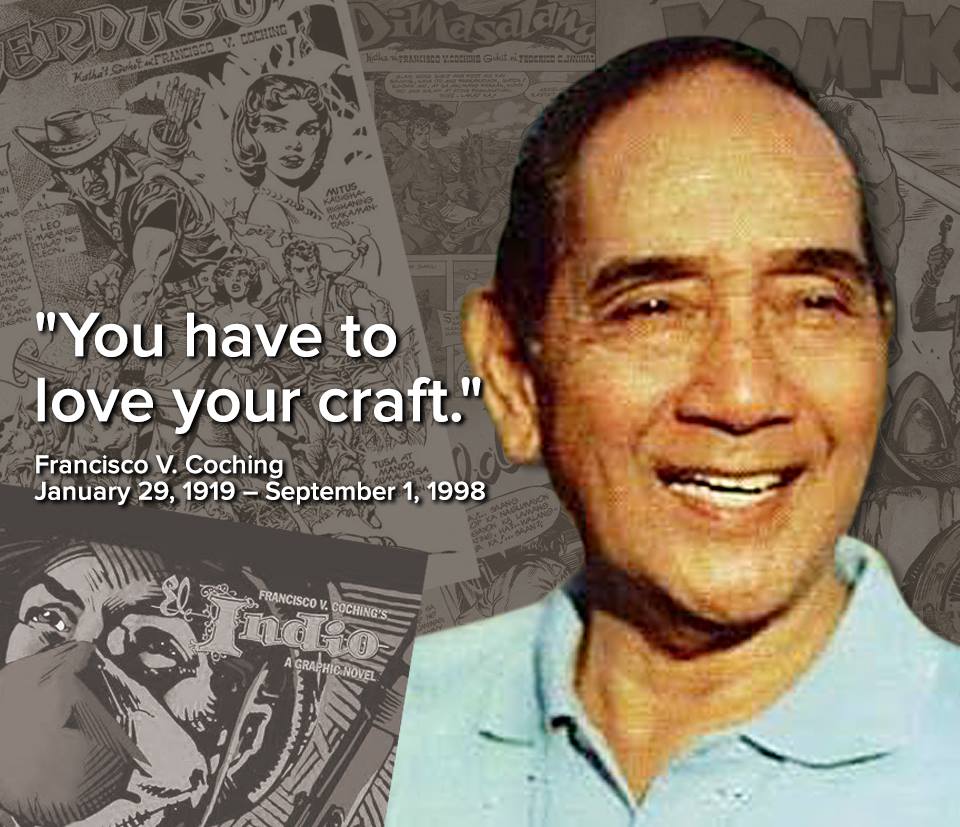By Francis Felix Falgui – PTV News

An artist creates many wonders when guided by his imagination and driven by his passion. However, it is marvelous when the passion of the artist to improve his craft has also become a tool to revolutionize an entire industry. One such artist is Francisco Coching—the dean of Philippine Comics.
Being the son of the novelist and comic illustrator Gregorio Coching, Francisco’s interest for comics began early. His father would bring him to Liwayway Publications wherein he would meet different artists such as Philippine comic pioneer Francisco Reyes—who served as a great influence to Coching.
This early exposure to illustrative arts sparked Coching’s interest quickly and later on became a career path when he began as an apprentice of illustrator Tony Velazquez. Coching showed what he was capable of by creating Bing Bigotilyo for Silahis Magazine at the young age of 15. After which, he created the warrior Marabini for Bahaghari Magazine. However, tragedy struck when Marabini’s reign in the comics arena was cut short due to World War II.
When the Second World War reached the shores of the Philippines, Coching’s love for the country prevailed. He set his passion for making comics aside and instead fought against the Japanese forces as a guerrilla under the Kamagong Unit of Hunters ROTC.
Despite the grim time for both the country and Francisco, he found a silver lining when he met and married Filomena Navales in 1944.
After the war, Coching took another shot as a comic book illustrator starting with Hagibis, a character similar to Tarzan for Liwayway Magazine. The series exploded in popularity with a three year run from 1947-1950 and a movie adaptation starring Fernando Poe Sr. Hagibis marked the beginning for Francisco’s career, which started to flourish with the coming of the Golden Age of Philippine Comics between the ‘50s and ‘60s. During the Golden Era, he produced 53 comic novels, 50 of which were adapted into movies.
Coching’s works have received a wide audience acceptance as well as various accolades. He raised awareness on the identity of the Filipino people, by sending a message of patriotism as a central theme of his publications. This has been evident in the adventures of the heroic indigenous Filipino in Lapu-Lapu and Sagisag ng Lahing Pilipino, and in the portrayal of beautiful yet strong women in the aforementioned Marabini. In fact, the National Commission for Culture and the Arts (NCCA) noted that “in his characters and storylines, Coching brings to popular consciousness the issues concerning race and identity.”
He also showed versatility and growth as manifested in his stories which grew more sophisticated. His stories drew inspiration from his experiences as a guerrilla and the life during post-war era, which was evident in his work, Movie Fan. Other notable and thought provoking series which Coching penned include Pusakal, Talipandas, Gigolo, and Maldita.
After 39 years in the comic book industry, Coching’s career came into a close in 1973. He passed away on September 1, 1998, but not without a legacy.
Coching’s works “mesmerized the comics-reading public as well as his fellow artists, cartoonists and writers,” as noted by NCCA. His works forged comics as a medium for verbal and visual literacy, promoting Filipino as the national language in the process and served as an inspiration to other notable comic book artists such as Federico Javinal, Nestor Redondo, Larry Alcala, Emil Rodriguez, Noly Panaligan, Carlos Lemos to name a few.
But, the greatest reminder of his contributions to Philippine comics was when he named as the National Artists of the Philippines for Visual Arts posthumously in 2014 after being nominated twice for the same honor in 1999 and 2001.
Francisco Coching was an unassuming, quiet private man who used his unimaginable creativity to exude nationalism. A man of visual talent, Coching has proven that arts can be a formidable medium not only of self-expression, but it also serves as a vessel to carry out advocacies and incite a peaceful battle and evoke noteworthy and positive change among nations.
